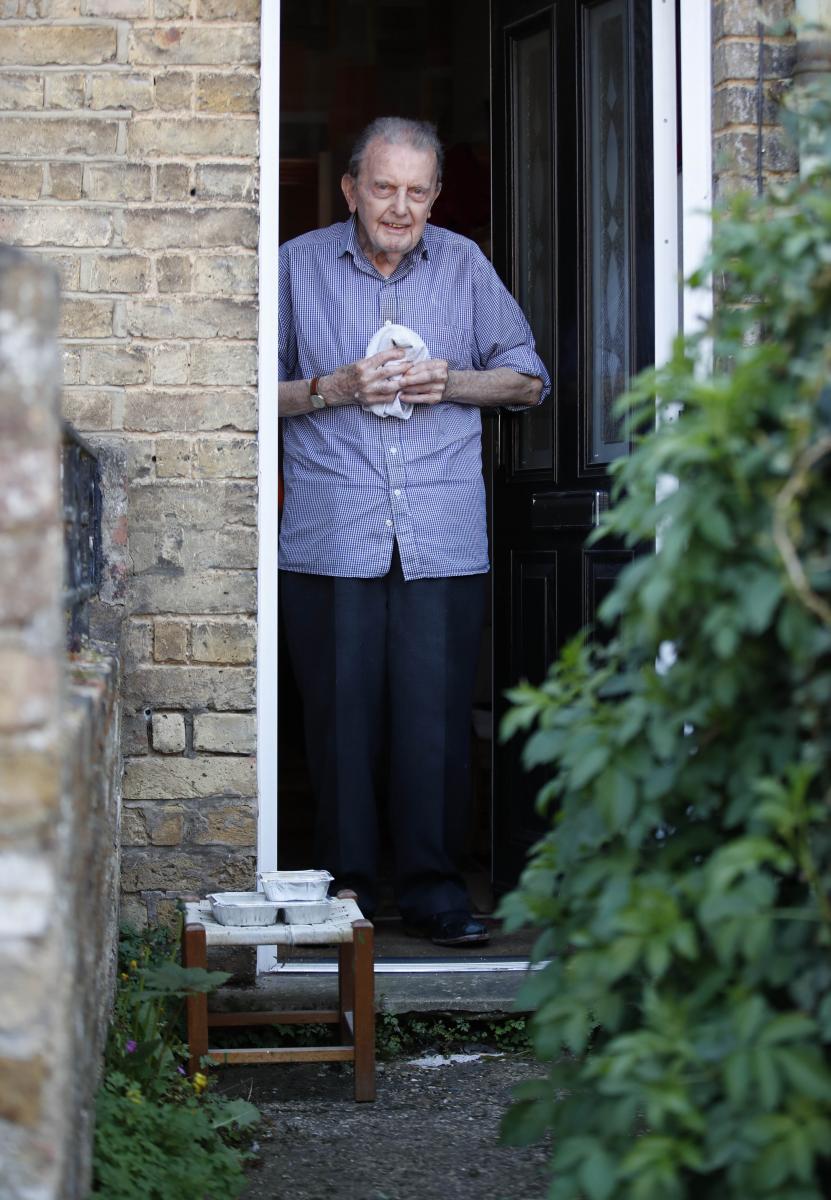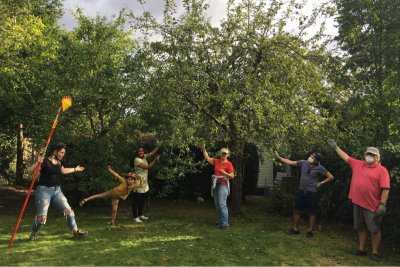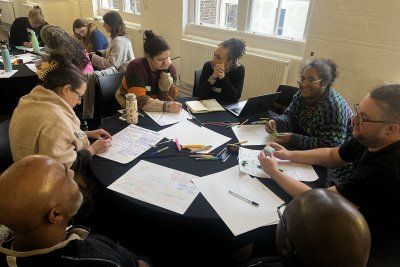

How meals on wheels are making a comeback in the Covid-19 crisis
The Covid-19 crisis has shone a new light on the issue of how and whether older people are getting the food that they need to be healthy, daily. In a series of blog posts, Morven Oliver-Larkin will be sharing reflections and learning from her research into meal services for older adults, before and during coronavirus.
The Covid-19 coronavirus pandemic is making many of us wonder how our older relatives and neighbours might be coping and has provoked community responses, alongside a spike in demand for existing services.
The crisis has had profound implications for the food system and for many people's ability to access food, including older adults and others most vulnerable to the virus. In this first blog post, I look at some of the community responses emerging which aim to get food to older adults, as well as the increased pressure on existing meals-on-wheels services, before exploring questions that the current crisis provokes.
This spike in demand has arisen in a context of deep cuts to services seen as ‘nice to have’ rather than essential, despite their preventative benefits. Meals on wheels and lunch clubs have decreased across London, with only ten boroughs out of 33 currently funding some kind of service compared to 21 out of 33 as recently as 2016. Nationally, the picture is similar with provision falling by roughly 25% between 2014 – 2018.
From January 2020, as part of a small research project investigating this issue, I've been speaking to the people who commission, run and use meals on wheels services in the capital. I've had the pleasure of meeting some truly dedicated, hardworking individuals committed to helping maintain dignity and health for those who struggle to prepare meals in their homes, and to service users for whom a delivered hot meal makes health and independence possible.
Increased demand on existing services because of Covid-19
With increased numbers of older adults having to self-isolate alongside lunch clubs and other services closing, demand for meals on wheels and shopping services has spiked. These services are not the norm, but where they do exist the need for them has been made even clearer.
Food2You: Age UK Lewisham and Southwark’s shopping service Food2You delivers shopping to older adults and operates through a membership service. Since social distancing measures were put in place, all of their members are now using the service every week, where previously they relied on family members some weeks. Although they have successfully broken their delivery record the last three weeks in a row, they cannot keep up with demand: they are referring some inquiries to befriending services and mutual aid groups, have made a handful of emergency deliveries, and their waiting list has increased by 20 people.
The London Independent Living Service In Camden and Haringey, the London Independent Living Service (LILS), which provides a ‘more than meals’ service including a welfare check and nutritional screening, has had a 40% increase in demand. LILS was born from a larger service which operates across Hertfordshire, HILS, where they have received hundreds of new referrals since social distancing measures were first introduced, and are now delivering up to 1,800 meals per day.
“We’re doing our very best to adjust to the increase in demand”, chief executive Sarah Wren tells me. “Everyone is working incredibly hard, and I’m so proud to work alongside our amazing HILS and LILS teams. It’s a real privilege to be doing something that makes such a difference, and knowing that helps everyone to keep going. I feel really concerned for areas without this kind of service in place. How are they possibly coping?”
Community response
Communities across the UK have been responding to the needs of others at impressive scale and pace. Mutual aid groups have been set up, which self-organise to help neighbours with essential shopping, and provide emotional support to those self-isolating over the phone. Some school kitchens (no longer being used for free school meal provisionhave been repurposed to feed vulnerable adults in the community, as have pubs like the Duke of Buckingham in Portsmouth. Individuals have been cooking hot meals for their older neighbours, and new community groups have been set up specifically to cater to people in the community who are unable to leave their home or to cook meals.
Existing community food organisations have also reoriented their work to what is most needed. Examples include Made in Hackney in London and The Bevy in Brighton.
Made in Hackney Made in Hackney is a community food group which usually focuses on running sustainable, plant-based cookery classes. On 27 March it started running a free meal delivery service for anyone who needs it, Monday – Friday.
The Bevy A community pub and café in Brighton, the Bevy has been working towards a meal delivery service for older adults. When the crisis hit, they fast-tracked their ‘Bevy Bites’ scheme and are now delivering meals three times per week to those who, pre-crisis, had been attending their lunch clubs.
Government response so far
At the time of writing, the Government had announced and begun the roll out of emergency food aid parcels to those most medically vulnerable to the effects of infection from Covid-19. This is a welcome step, but does not cover many who are at increased risk; for example it does not provide food packages for people based on age, and predominantly provide items such as pasta or tinned goods, thus not accounting for those unable to cook. At Sustain we are instead calling for the reinstatement of meals on wheels services across the country.
In light of these new initiatives, we have some emerging questions. Sarah Wren’s question about how other areas – and the older people who live in them – are coping, springs to mind for me. I can’t help but wonder how many people are slipping through the cracks, unable or too worried to leave their home. Are they getting the food they need? If community responses help some, who is being missed?
We of course acknowledge that we are in extraordinary situation with high pressure on organisations delivering meals, but I hope these questions will help to develop the mechanics of emergency responses, as well as start to explore how these initiatives might take us to better support for older people in the longer term.
- What are the best ways to identify people in need? How can councils, housing associations, mutual aid groups and others play a role, while maintaining safeguarding? And who is best placed to oversee provision? Made in Hackney’s referral form for a suggested way of receiving referrals or The Bevy’s simple phone ordering system offer useful starting points.
- Can provision be ‘more than a meal’ during Covid-19? Are discrete welfare checks still possible in some way? How can this be safely carried out and recorded? Lessons could be shared and learned from LILS approach on this.
- Can meals be culturally and nutritionally appropriate and aligned to the Eatwell Plate? At a time when older adults have increasing health risks, nutrition seems especially important.
- Are there opportunities to decrease stigma, deliver meals in a dignified way and foster people’s interest in receiving a delivered meal or going to a lunch club in the longer term? Perhaps we could learn from the Mutual Aid groups here, whose focus on the simplicity of neighbours helping one another, and of mutual support, highlights the fact that we all need each other.
- How can we address common practical barriers, e.g. skills and knowledge, access to vehicles, parking permits or packaging? Can existing resources and trained people be re-deployed? Made in Hackney’s video on Emergency Feeding Services: Things to think about could be useful here.
- Are there possibilities for pop-up or enterprising initiatives to have a long-term future? While these are emergency responses, are there opportunities to test approaches and business models? How can they realistically gather evidence of need and demand?
- How could this benefit existing food providers or outlets and safeguard jobs in the short-term and perhaps longer-term? Staff at LILS who I had the pleasure to shadow are clearly skilled workers, and it is right that they are paid. In a future blog post I will outline this further.
Over the coming weeks and months, I hope to gain insights into these questions, and to do this by listening to and learning from those on the front lines. I will share my learning in future blog posts, beginning with a second post reflecting on best practice I’ve seen first-hand before the Covid-19 crisis hit.
Morven Oliver-Larkin is the London Food Poverty Campaign Coordinator at Sustain: the alliance for better food and farming.
If you work on preparing or delivering food to older people in any capacity, whether through the council, a charity or community group, or in a voluntary capacity in response to the crisis, I would love to hear from you. I will do what I can to learn from and share your expertise in this area. Please get in touch by email: morven@sustainweb.org
Coronavirus Food Alert: Sustain's work on food resilience in the COVID-19 coronavirus pandemic.We are helping secure food for vulnerable people and supporting local emergency responses.
Sustain
The Green House
244-254 Cambridge Heath Road
London E2 9DA
020 3559 6777
sustain@sustainweb.org
Sustain advocates food and agriculture policies and practices that enhance the health and welfare of people and animals, improve the working and living environment, promote equity and enrich society and culture.
© Sustain 2026
Registered charity (no. 1018643)
Data privacy & cookies
Icons by Icons8







